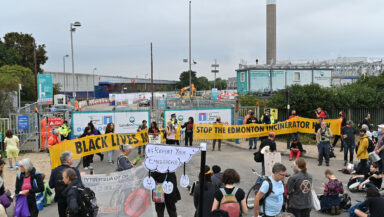Ahead of the anticipated easing of lockdown restrictions next week, a broad coalition of environment and transport organisations are calling on the Westminster national government and local leaders to urgently and fundamentally redesign transport in a way that is better for public health, cleaner air and the climate.
In an open letter – written to the Secretaries of State for Transport, Environment, the Chancellor, leaders of local and regional authorities, and city mayors – 9 NGOs, including, Greenpeace UK, Living Streets, Cycling UK, Transport & Environment and CPRE the countryside charity, set out demands that would transform our streets, such as, cycle lanes on all main roads and the creation of ‘Mini-Hollands’ in all towns and cities.
The plans would make it safer for people cycling and walking, prioritise public transport, drive down private car use and avoid a dangerous rise in air pollution once lockdown restrictions are lifted.
Rapid redesign measures, such as widening pavements and increasing cycle lanes, giving priority to people who walk and cycle, should be introduced by local leaders straight away, the letter states. These measures would then be made into permanent infrastructure once additional resources and funding from national government are provided.
As part of the government’s green recovery plan, the coalition is calling for at least £6 billion in funding over the next 5 years to get the government on track to reaching its target of doubling cycling and increasing walking by 2025, with further funding thereafter to increase walking and cycling to levels seen in the Netherlands.
Restrictions brought in to tackle the coronavirus pandemic have resulted in an unprecedented drop in road traffic and a fall in air pollution of up to 60% in parts of the UK. But, according to a new YouGov poll, commissioned by Greenpeace UK, 71% of people are concerned about the possibility of air pollution returning to levels experienced before the lockdown, once restrictions are lifted [1].
Greenpeace UK’s head of politics, Rebecca Newsom, said:
“There are many things about the lockdown people will be glad to leave behind, but cleaner air is not one of them. Yet there’s a real risk that congestion and toxic pollution will be back on our streets as soon as restrictions are lifted. Some of the world’s major cities are already reshaping the urban space to allow people to go out and about safely while keeping the air clean, and we need our political leaders to follow suit.
“By scrapping the controversial roads programme and repurposing the £27 billion earmarked for new roads, the government could transform our towns, cities and the way we move through them by creating networks of low-traffic neighbourhoods. As well as making post-lockdown life safer for everyone, by reducing traffic – and with it carbon emissions – we will also make huge strides towards tackling the climate emergency.
“There is clearly a public appetite for these changes that would transform our streets and lives for the better. But if our political leaders fail to act now, we may never get another chance to tackle air pollution at this scale ever again.”
Other transformative measures called for in the letter include 20mph speed limits in built-up areas and banning the sale of new petrol and diesel cars and vans by 2030.
The YouGov poll shows public support for a number of the preventative measures set out in the letter. 58% of people support introducing cycle lanes on all main roads in urban areas, as well as increased government funding for walking and cycling infrastructure. A majority of people expressing an opinion (41% and 46% respectively) also want to see petrol and diesel cars and vans banned by 2030, and the £27 billion allocated for building new roads redirected towards public transport, walking and cycling and broadband investment.
Some of Europe’s largest cities such as Milan and Brussels have already taken steps to prioritise walkers and cyclists in their city centres, while Paris will be rolling out 650 kilometres of cycleways over the next few days. In the UK, there have been isolated initiatives but for this change to be transformational and long-lasting it needs to be promoted and coordinated by both central and local government.
ENDS
List of signatories: Greenpeace UK; CPRE, the countryside charity; Cycling UK; Environmental Defense Fund; Global Action Plan; Living Streets; Possible; Transport Action Network; Transport & Environment.
For the YouGov poll results, visit here.
Contact:
Greenpeace UK Press Office – press.uk@greenpeace.org or 020 7865 8255.
Supportive quotes:
Cycling UK’s Policy Director Roger Geffen said: “The country is looking forward to a gradual release from lockdown, yet there will inevitably be limits on the capacity of our public transport systems and on people’s willingness to use them. Urgent action is therefore needed to redesign our streets, preventing a massive resurgence of motor traffic while allowing key workers and school pupils alike to carry on getting around safely on foot or by bike.
“We then need a long-term cycling and walking investment strategy to help retain the clean air and quiet streets which have been among the most noticeable ‘silver linings’ of this horrible crisis.”
Jenni Wiggle, interim CEO of Living Streets said: “As we look how to transition out of lockdown, it’s important we keep private car use at lower levels to further improve our air quality and embrace healthier habits, such as walking and cycling. Lockdown is making us all realise how much public space is given over to vehicles. Narrow footways, inappropriate speed limits and cars parked on pavements are all impacting on our ability to travel actively and healthily.
“However, these aren’t new issues. They have been impacting everyone’s ability and desire to walk and cycle for decades. Now is the time to plan out public space for the future. We all need to walk more and drive less, to help tackle the crises of public health, traffic congestion, air pollution and climate change. We need secure long-term funding for walking and cycling to create a healthier and cleaner country and better streets for all.”
Chris Large, Senior Partner at Global Action Plan, said: “Covid-19 and the lockdown are tragedies and we have a lot to recover from. For everyone’s health, it’s vital that every possible measure is taken to limit the return of air pollution, and to help people get safe exercise through more walking and cycling. Active travel also boosts mental health and tackles the climate crisis, whilst cycle lanes are proven to increase local high street trade. It’s a win on so many levels.”



